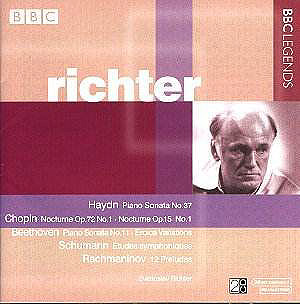There is no question that Sviatoslav Richter was one
of the great artists of the 20th century, and this 2CD set finds him
at the top of his form. The repertoire is music which was closely associated
with him, and he has special things to say about all the composers featured.
The performances are live, drawn from the annual tours he undertook
during the late 1960s.
Full marks should go to both the original BBC engineers
and to those responsible for the CD remasterings. The sound is very
good, to the extent that one is aware of the subtle changes of acoustic
and perspective from venue to venue. The audiences are well behaved
on the whole, though there are occasional unwanted contributions, for
example at the beginning of the Beethoven scherzo, when it seems Richter
was ready before some of his listeners.
These are real interpretations, and Richter is never
content with the routine. He takes risks, not least in the Beethoven
Sonata, when the later statements of the principal first movement material
are characterised with different dynamic shadings which stretch the
letter of the score but bring an extra dimension of intensity. His special
feeling for Beethoven is continued in the famous Eroica Variations,
which do build heroically in a sweep of momentum which makes the whole
affair much more than the sum of its parts.
It is temptingly easy to underestimate Haydn's sonatas
in comparison with those of Beethoven and Mozart. But as Chris de Souza
points out in his admirable booklet notes, Haydn composed more such
pieces than the other two combined. The spontaneity of manner of the
E major Sonata is brilliantly articulated by Richter, and the slow movement
is particularly imaginatively done.
The two Chopin Nocturnes are idiomatically phrased
and shaped, although there is a tendency towards closely placed microphones,
in the sense that the louder passages sound unduly loud in the general
context, more so than the ambience of the performance might suggest.
Schumann's Symphonic Etudes, like the Beethoven variations,
generate a sweeping momentum and a visionary intensity. But the highlight
of the whole collection is surely the 1969 Manchester performance of
the Rachmaninov Preludes, Richter's own selection of twelve pieces from
Opus 23 and Opus 32. Both in the more subdued and the more extrovert
of these the playing is peerless. While the sound of some of the more
recent recordings of this music may be more sophisticated, it is Richter
who will provide the benchmark by which all others are judged.
Terry Barfoot


